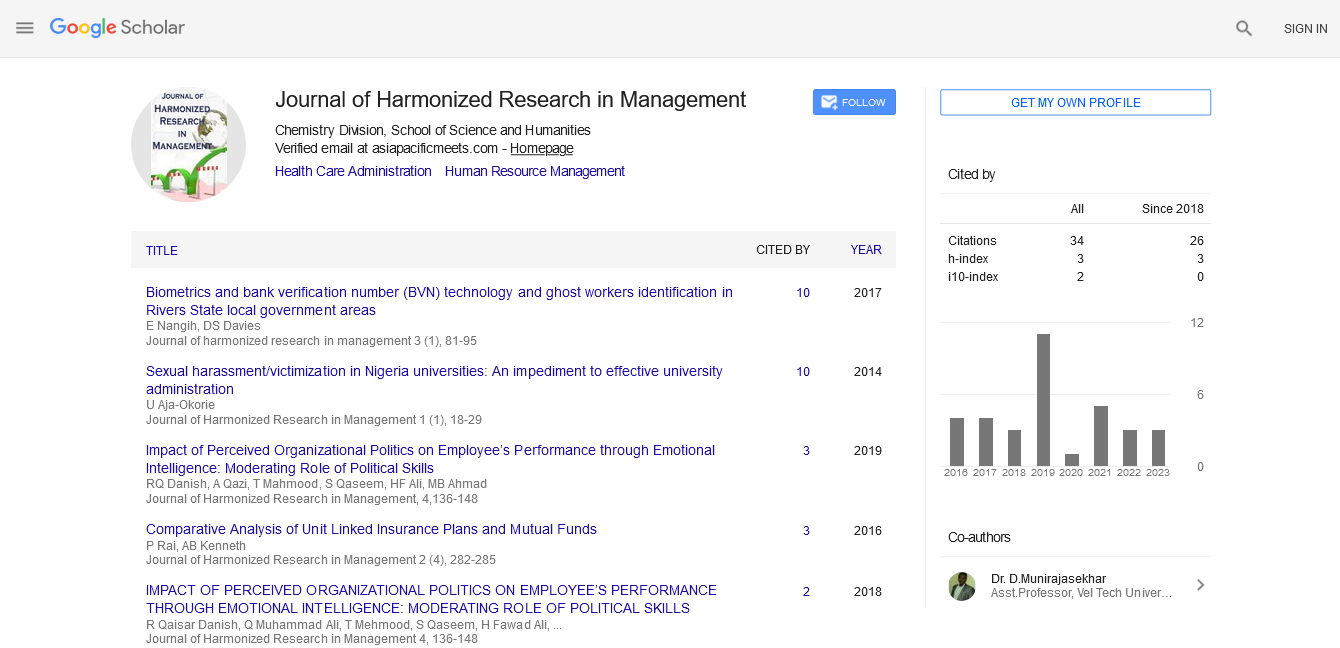Opinion Article - (2022) Volume 8, Issue 2
ADMINISTRATION OF HEALTHCARE AND INTEGRATION OF PRIMARY AND SECONDARY CARE
Letindre Larsson*Received: Sep 01, 2022, Manuscript No. JHRM-22-77717; Editor assigned: Sep 05, 2022, Pre QC No. JHRM-22-77717 (PQ); Reviewed: Sep 19, 2022, QC No. JHRM-22-77717; Revised: Sep 27, 2022, Manuscript No. JHRM-22-77717 (R); Published: Oct 05, 2022, DOI: 10.30876/2354-5384.22.8.127
Description
The management of all non-clinical activities at a healthcare facility, including daily operations, staffing, budgeting, financial management, and long-term strategic planning to ensure the success of the healthcare provider or system The process of overseeing and controlling every element of the commercial side of providing healthcare services is what is commonly referred to as healthcare administration.
Tasks and Responsibilities
• Making sure that health care laws and regulations are followed
• Finding, hiring, training, and managing employees
• Keeping meticulous records of office and medical supplies
• Coordinating caregivers’ and other employees’ work schedules
• Catching pace with patient medical records
• Maintaining patients while ensuring quality and efficacy
• Processing insurance claim processing
Health and Medical Administration in Today’s World
With the development of technology, hospitals have grown to be substantial, complicated institutions. Private payment for healthcare has given way to an intricate system of third-party reimbursement. They always concentrate on the operational and financial elements of hospitals, clinics, and other health services, with a focus on effectiveness and financial stability. In the field of health systems management, there are numerous professional organisations that fall under the categories of institutional or personal membership groups. Individuals can join personal membership groups, which usually concentrate on the development of members’ individual skills and careers.
The Healthcare Financial Management Association and the Healthcare Information and Management Systems Society are two organisations with larger individual memberships. Organizations join institutional membership groups, which primarily concentrate on organisational success and may also contain data sharing agreements and other mechanisms enabling member organisations to share administrative or medical practise.
Definition of Primary Health Care (PHC)
Primary healthcare is fundamental medical care that is made widely available to people. It is a crucial component of both the nation’s PHC serves as the basis of both the whole social and economic health care system and the growth of the neighbourhood. Promote, preventative, curative, and rehabilitative care are emphasized in primary health care. In other words, it promotes the delivery of extensive, on-going, useful, and high-quality care.
A PHC-based system implies a comprehensive approach based on lessons learned and identification of fundamental values in order to set national priorities and assess whether or not social changes respond to the needs and expectations of the population; principles that establish the foundations for health care policies, legislation, evaluation criteria, production, and allocation of resources for operation of the health system; elements that, in a PHC-based health system, comprises the functional and organisational elements that assist in the administration of policies, programmes, and services.
Strategy for primary healthcare
Primary Health Organizations will coordinate care for its enrolled patients even though they won’t be more in charge of providing all services. Primary Health Organizations will be in charge of maintaining valuable data on their enrolled patients and, when necessary, connecting those patients with relevant service providers. They will serve as the main point of contact for both community and secondary care providers. To maximise prospects for early detection and prevention of health issues, Primary Health Organizations will collaborate with other agencies and providers.
Ideal management and organization
An ideal management and organisation are needed for the structures and operations of a PHC-based health system. A legal, political, and institutional framework that identifies and reinforces actions, actors, and processes is part of this, as are the legal and financial frameworks that allow the team to carry out its specific responsibilities during the decision-making process. Good management techniques are necessary for PHCTs’ operational activities in order to facilitate care coordination organisation and delivery.
Secondary Care
District or regional hospitals that offer outpatient consultation and hospitalization treatments, including emergency care, provide secondary care. The secondary health facilities are staffed by internists, neurologists, nurses, and skilled technicians. These centres typically offer laboratory facilities, electrophysiological, and Computerised Tomography (CT) scans. Primary care clinics in their district or region are also afforded technical and administrative support through secondary care centres.
Co-Ordination between Primary and Secondary Care
The appropriate management of a wide range of health problems and disorders can only be accomplished with the intervention of secondary services. A number of primary healthcare providers have successfully implemented programmes to improve care coordination. In order to present other provider organisations with viable solutions to major systemic issues, it is crucial that successful local efforts be disseminated globally. Primary Health Organizations, District Health Boards, and the Ministry of Health are all responsible for this.
Initiatives that are specifically designed to enhance coordination between primary and secondary comprise:
• Expanding on existing advancements, especially increased main access to secondary healthcare services such diagnostic tests, and the creation of electronic decision support systems and referral guidelines
• Using recommendations based on research and other helpful resources. effective patient management and clinical decision-making in primary healthcare, with accommodating and timely assistance from additional services
• Creating regional programmes that integrate primary healthcare practitioners and hospital medical staff to improve hospital access
• Assistance and counselling services for primary care in regulating conditions.

Google Scholar citation report
Citations : 92
Journal of Harmonized Research in Management received 92 citations as per google scholar report









